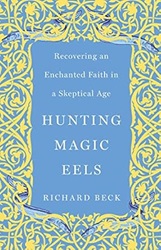Recovering an Enchanted Faith in a Skeptical Age
by Richard Beck
Broadleaf Books, 2021. 237 pages.
Review written August 21, 2024, from my own copy, purchased via Amazon.com
Starred Review
I picked up this book at exactly the right time. I’d just finished a book I was reading during my daily devotional time and was looking for one to bring on a retreat I was attending in North Carolina with Lorna Byrne. Lorna Byrne is the author of Angels in my Hair and has all her life been able to see and talk with angels. My natural tendency is to bring skepticism to her teachings – and this book helped me get out of my head and listen with my heart to her words.
Here’s a section from the Introduction where the author explains the magic eels of the title:
Llanddwyn Island was a famous site of pilgrimage because of its holy well. Inhabiting the well were enchanted eels that could predict your romantic future. According to the legend, if the eels disturbed a token thrown into the well, your lover would be faithful for life. Not surprisingly, the church became very wealthy due to all the pilgrimages. Who needs premarital counseling when you’ve got magic eels?
Today, there is no longer a well there with magic eels. And we hear the story with skepticism and condescension.
Five hundred years ago, life was enchanted. God existed, and the devil was real. The world teemed with angels and demons. There were magical creatures and dark, occult forces. It was a world of holy wells and magic eels.
But with the Protestant Reformation and the beginning of the Enlightenment, the world – in the West, at least – has grown increasingly disenchanted. We live in a world dominated by science and technology. Increasing numbers of us don’t believe in God anymore, to say nothing about believing in the devil or angels. We don’t expect miracles. We know that stage magicians aren’t sorcerers, that there’s a rational explanation behind their “tricks” and “illusions.” The world of St. Dwynwen is viewed as quirky and quaint but also naive and superstitious. We’ve grown up and left those fairy tales behind.
This is the topic of the book. Recovering enchantment with our faith. Getting it centralized not so much in our heads as in our hearts. Experiencing and encountering God, rather than just knowing about God.
And yes, there’s a section at the end about discerning the spirits – because not everything “spiritual” is of God. But overall, the book is about paying attention and being willing to have some enchantment with your faith.
The final page sums up much of where this book takes you:
And so, dear reader, this is my final encouragement: Love like the sunshine and the rain. Ask forgiveness of the birds. Be a drop more gracious, tender, and kind. Go gently in this mean world. Offer up prayers of Thanks, Help, and Wow. Recover your sacramental wonder. Count your blessings. Look to the horizon in the Valley of Dry Bones. Remember that you are a child of God. Rush to kiss the lepers. Listen to the voice in the night calling you to the cross. Turn yur attention to the God dancing right in front of you. God is everywhere present, breathing on this world and turning it to fire. Where you stand is the gateway to heaven. The world is shining like transfiguration. Even the eels.
It only takes a little willingness to see.
If you’re a Christian whose life seems lacking in enchantment lately, or even if, like me, you want encouragement to believe in mystical things like angels or miracles, to get your faith more in your heart than in your head – this book will encourage you along that path.
And I’m choosing to believe that my timing in reading this book wasn’t a coincidence, but was from God.
experimentaltheology.blogspot.com/
broadleafbooks.com
Find this review on Sonderbooks at: www.sonderbooks.com/Nonfiction/hunting_magic_eels.html
Disclosure: I am an Amazon Affiliate, and will earn a small percentage if you order a book on Amazon after clicking through from my site.
Disclaimer: I am a professional librarian, but the views expressed are solely my own, and in no way represent the official views of my employer or of any committee or group of which I am part.
What did you think of this book?
